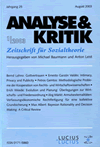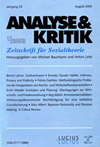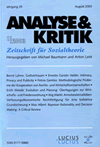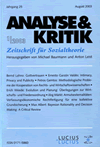Suchergebnisse
"Dieter Birnbacher"
Titel: Can There Be Such a Thing as Ethical Expertise?
Autor: Dieter Birnbacher
Seite: 237-249
Abstract: Ethics in the 21st century is threatened by a split between practical philosophy as a full-blown academic discipline and applied ethics as pragmatic problem-solving inside the political process. The place of the professional philosopher sitting on medical and other ’ethics committees’ as an ’ethical expert’ is somewhere in between. But where exactly? How is his role defined? Is the expertise he brings to bear on practical decisions of a purely technical or of a substantially moral kind? These issues are discussed both ’from the outside’ and ’from the inside’. First, some of the theoretical controversies surrounding ’ethical expertise’ are discussed on the background of a rapidly growing literature in the field. These are then related to the realities of commission work as they confront the academic ethicist in practice.
Titel: Experts, Teachers and Their Epistemic Roles in Normative and Non-normative Domains
Autor: Tobias Steinig
Seite: 251-274
Comments on Dieter Birnbacher and Karen Jones & François Schroeter
Abstract: Goldman’s notions of expert and testimony in epistemological contexts are extended to normative issues. The result is a sketch of a conceptual framework: several types of experts and roles they can serve in informing not specially qualified recipients are distinguished; differences between experts in epistemological and moral contexts are highlighted. This framework then is the point of reference for claims about experts, expertise and moral testimony in Birnbacher’s and Jones & Schroeter’s contributions to this volume. First, Birnbacher’s worries about the legitimacy of moral philosophers sitting as experts on panels, etc. are allayed in one respect and aggravated in another: there are roles and qualifications open to informants about normative issues, but it is doubtful whether moral philosophers per se are up to each of them. Secondly, Jones & Schroeter’s objection to Hills’s claim that moral testimony cannot orient its recipient properly towards right-making reasons for acting is faulty.
Titel: Climate Responsibility as a Distributional Issue
Autor: Dieter Birnbacher
Seite: 25-37
Abstract: It is evident that the problem of global climate change is closely bound up with questions of distributional justice, both intra- and intergenerational. Questions of justice are raised by two kinds of burdens: reductions in the emission of greenhouse gases, and the financial and knowledge transfers necessary to enable the poorest countries to compensate the harms suffered by the ongoing process. Both burdens involve considerable costs and opportunity costs. On the backdrop of a prioritarian version of utilitarianism, it is argued that the answer should be a split strategy. While reduction of emissions should be based on the polluter-pays principle, obligations of compensation should be based on the criteria of overall economic strength.
Titel: Binmore’s Humeanism
Autor: Dieter Birnbacher
Seite: 66-70
Abstract: David Hume is quoted in Binmore’s book Natural Justice more than any other author, past or present, and throughout with a markedly positive attitude. It is argued that this affinity is reflected in many characteristic features of Binmore’s approach to fairness and social justice and especially in the central role motivational issues are made to play in his theory. It is further argued that Binmore shares with Hume not only important strengths but also certain weaknesses, among them a ten- dency to derive from the limited evidence of past history far-reaching statements on human nature and the conditions thereby imposed on social morality.
Titel: Kommentar zu Gaertner/Schwettmann
Autor: Dieter Birnbacher
Seite: 315-319
Abstract: The changes in the meaning of social justice described by Gaertner and Schwettmann are interpreted as a shift of emphasis within a relatively constant family of meanings. It is argued that any workable concept of social justice is the product of a balancing of a number of different principles of justice that are strictly incompatible and easily come into conflict with one another. In response to changing economic and cultural conditions certain members of the family are given priority without completely abandoning the other members. A parallel is drawn with the changes in the conceptions of justice operative in the distribution of scarce organ transplants.
Titel: Utilitaristische Ethik und Tötungsverbot. Zu Peter Singers Praktische Ethik
Autor: Dieter Birnbacher
Seite: 205-218
Abstract: One of the standard criticisms of classical utilitarian is that it is unable to provide an adequate ethical foundation for the wrongness of killing. It is reasoned that the five arguments against killing available to the classical utilitarian are indeed sufficient to provide such a foundation and that recourse to preference utilitarianism is neither called for nor helpful since it generates a number of problems of its own. On this basis, Singer's discussion of selective abortion and the selective euthanasia of newborns is criticized from within utilitarianism for not giving sufficient weight to direct and indirect social side-effects, especially if ,external, criteria are introduced into the valuation of human life.
Titel: Das moralische Dilemma der nuklearen Abschreckung
Autor: Dieter Birnbacher
Seite: 175-192
Abstract: The moral dilemma of nuclear deterrence arises from two conflicting facts: the fact that in a world of conflicting superpowers with nuclear arsenals preserving peace must have an overriding moral priority; and that a policy of mutual nuclear deterrence, which seems well suited to achieve this aim, faces grave moral difficulties on its own, the main difficulty being the moral indefensibility of the act of retaliation threatened in case of attack. It is argued that a consequentialist approach to the moral assessment of nuclear deterrence is in principle able to provide a solution to this dilemma by reducing the moral dilemma to a non-moral dilemma which can in turn be solved by a comparison of risks. In this connection, a theory of the ,functional, assessment of intentions is developed in order to subject even threats involving a conditional intention to retaliate to consequentialist reasoning.

Social Epistemology
2012 (34) Heft 2
Editorial
The research program of social epistemology developed from a critique of philosophical epistemology around thirty years ago. Since then it has attracted ever-growing attention among philosophers. But social epistemology also offers prolific alignments for the social sciences. The starting point of social epistemology is the elementary fact that most of our knowledge is acquired not by our own autonomous exploration but by relying on information from others: on testimony. This is especially true ...

The Relevance of Ideal Justice
2011 (33) Heft 2
Guest-Editors: Lukas Meyer / Pranay Sanklecha
Editorial
Whether and how normative theorising can be relevant for guiding people’s actions is one of the classical questions of moral and political philosophy. Platon’s dialogues Politeia, Politikos and Nomoi provide fascinating discussions on the topic. Recently normative theorists have investigated some aspects of these questions under the title of ideal and non-ideal theorising—relying on a distinction that Rawls introduced in A Theory of Justice (1971) and made use of in his The Law of Peo...

Climate Change, Risk and Responsibility
2010 (32) Heft 1
Guest-Editor: Friedrich Breyer
Editorial
Global warming has arguably been the topic which has drawn the most attention both in the media and in academia and even in international politics over the first decade of the new millennium. Moreover, climate change is a typical field for interdisciplinary research: while natural scientists try to predict the impact of anthropogenic greenhouse gas emissions on average temperatures, climate events (such as floods, droughts and hurricanes) and sea-level rise over the next century and more, philos...

The Actuality of Communitarianism
2005 (27) Heft 2
Editorial
'Communitarianism' drew extraordinary public attention in the early nineties and still exerts some influence on the social sciences and political philosophy, even if it is no longer as controversially debated as in former days. What still fires interest in the claims and ideas of communitarianism today, albeit on a lower level of public attention, is the widely felt fascination, in part perhaps also trepidation, vis-a-vis non-individualist social phenomena and trans-individualist social values a...

Euthanasie heute - Thema oder Tabu?
1990 (12) Heft 2
Editorial
Der australische Philosoph Peter Singer soll mit Gewalt zum Schweigen gebracht werden. Er hat mit der Euthanasie ein moralisches Problem zum Thema der öffentlichen Erörterung gemacht, das nach Meinung seiner deutschen Gegner ein Tabu bleiben muß. Die Botschaft, die von diesen Gegnern Singers ausgeht - unter ihnen eine Reihe von Philosophieprofessoren -, besteht nicht darin, daß Singer Auffassungen vertritt, die in der Sache hart kritisiert werden müssen, sondern die Botschaft lautet: Man so...